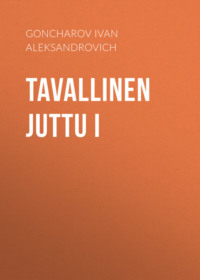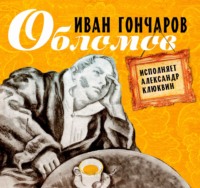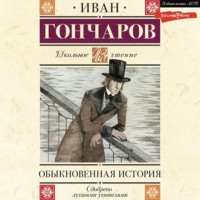
Полная версия
Oblomov / Обломов. Книга для чтения на английском языке
It was the time of solemn and universal stillness in nature, a time when the creative mind is most active, when poetic thoughts are fanned into flames, when passion burns more brightly or anguish is felt more acutely in the heart, when the seed of a criminal design ripens more imperturbably and more strongly in the cruel heart, and when everybody in Oblomovka is once more peacefully and soundly asleep.
«Let’s go for a walk, Mummy», said Oblomov.
«Good heavens, child», she replied, «go for a walk at this hour! It’s damp, you’ll get your feet wet, and it’s so frightening: the wood-demon is walking about in the woods now, carrying off little children».
«Where to? What is he like? Where does he live?» the little boy asked.
And his mother gave full rein to her unbridled fancy. The boy listened to her, opening and closing his eyes, till at last he was overcome by sleep. The nurse came and, taking him from his mother’s lap, carried him off to bed asleep, his head hanging over her shoulder.
«Well, thank goodness, another day gone», the Oblomovka inhabitants said, getting into bed, groaning, and crossing themselves. «We’ve lived through it safely, God grant it may be the same to-morrow! Praise be unto thee, о Lord!»
Then Oblomov dreamt of another occasion: one endless winter evening he was timidly pressing closely to his nurse, who was whispering a fairy-story to him about some wonderful country where there was no night and no cold, where all sorts of miracles happened, where the rivers flowed with milk and honey, where no one did a stroke of work all the year round, and fine fellows, like Oblomov, and maidens more beautiful than words can tell did nothing but enjoy themselves all day long. A fairy godmother lived there, who sometimes took the shape of a pike and who chose for her favourite some quiet and harmless man – in other words, some loafer, ill-treated by everyone, and for no reason in the world, bestowed all sorts of treasures on him, while he did nothing but eat and drink and dressed in costly clothes, and then married some indescribable beauty, Militrissa Kirbityevna. The little boy listened breathlessly to the story, pricking up his ears, and his eyes glued to his nurse’s face. The nurse or the traditional tale so artfully avoided every reference to reality that the child’s imagination and intellect, having absorbed the fiction, remained enslaved by it all his life. The nurse told him good-humouredly the story of Yemelya-the-Fool, that wickedly insidious satire on our forefathers and, perhaps, on ourselves too. Though when he grew up Oblomov discovered that there were no rivers flowing with milk and honey, nor fairy godmothers, and though he smiled at his nurse’s tales, his smile was not sincere, and it was accompanied by a secret sigh: the fairy-tale had become mixed up with real life in his mind, and sometimes he was sorry that fairy-tale was not life and life was not fairy-tale. He could not help dreaming of Militrissa Kirbityevna; he was always drawn to the land where people do nothing but have a good time and where there are no worries or sorrows; he preserved for the rest of his life a predisposition for doing no work, walking about in clothes that had been provided for him, and eating at the fairy godmother’s expense.
Oblomov’s father and grandfather, too, had heard as children the same fairy stories, handed down for centuries and generations in their stereotyped form by their nurses.
In the meantime the nurse was drawing another picture for the little boy’s imagination. She was telling him about the heroic exploits of our Achilles and Ulysses, about the great bravery of Ilya Muromets, Dobryna Nikitich, Alyosha Popovich, Polkan the Giant, Kolechishche the Traveller, about how they had journeyed all over Russia, defeating numberless hosts of infidels, how they vied with each other in drinking big goblets of wine at one gulp without uttering a sound; she then told him of wicked robbers, sleeping princesses, towns and people turned to stone; finally, she passed on to our demonology, dead men, monsters, and werewolves.
With Homer’s simplicity and good humour and his eye for vivid detail and concrete imagery, she filled the boy’s memory and imagination with the Iliad of Russian life, created by our Homers in the far-off days when man was not yet able to stand up to the dangers and mysteries of life and nature, when he trembled at the thought of werewolves and wood-demons and sought Alyosha Popovich’s help against the adversities threatening him on all sides, and when the air, water, forests, and plains were full of marvels. Man’s life in those days was insecure and terrible; it was dangerous for him to go beyond his own threshold; a wild beast might fall upon him any moment, or a robber might kill him, or a wicked Tartar rob him of all his possessions, or he might disappear without a trace. Or else signs from heaven might appear, pillars or balls of fire; or a light might glimmer above a new grave; or some creature might walk about in the forest as though swinging a lantern, laughing terribly and flashing its eyes in the dark. And so many mysterious things happened to people, too: a man might live for years happily without mishap, and all of a sudden he would begin to talk strangely or scream in a wild voice, or walk in his sleep; another would for no reason at all begin to writhe on the ground in convulsions. And before it happened, a hen had crowed like a cock or a raven had croaked over the roof. Man, weak creature that he is, felt bewildered, and tried to find in his imagination the key to his own being and to the mysteries that encompassed him. And perhaps it was the everlasting quiet of a sleepy and stagnant life and the absence of movement and of any real terrors, adventures, and dangers that made man create amidst the real life another fantastic one where he might find amusement and true scope for his idle imagination or an explanation of ordinary events and the causes of the events outside the events themselves. Our poor ancestors groped their way through life, they neither controlled their will nor let it be inspired, and then marvelled naively or were horrified at the discomforts and evils of life, and sought for an explanation of them in the mute and obscure hieroglyphics of nature. A death, they thought, was caused by the fact that, shortly before, a corpse had been carried out of the house head and not feet foremost, and a fire because a dog had howled for three nights under the window; and they took great care that a corpse should be carried out feet foremost, but went on eating the same food and sleeping on the bare grass as before; a barking dog was beaten or driven away, but still they shook the sparks from a burning splinter down the cracks of the rotten floor. And to this day the Russian people, amid the stark and commonplace realities of life, prefer to believe in seductive legends of the old days, and it may be a long, long time before they give up this belief.
Listening to his nurse’s stories of our Golden Fleece – the Fire Bird – of the obstacles and secret passages in the enchanted castle, the little boy plucked up courage, imagining himself the hero of some great exploit – and a shiver ran down his back, or he grieved over the misfortunes of the brave hero of the tale. One story followed another. The nurse told her stories picturesquely, with fervour and enthusiasm, sometimes with inspiration, because she half-believed them herself. Her eyes sparkled, her head shook with excitement, her voice rose to unaccustomed notes. Overcome by a mysterious terror, the boy clung to her with tears in his eyes. Whether she spoke of dead men rising from their graves at midnight, or of the victims of some monster, pining away in captivity, or of the bear with the wooden leg walking through large and small villages in search of the leg that had been cut off – the boy’s hair stood on end with horror; his childish imagination was paralysed and then worked feverishly; he was going through an agonizing, sweet, and painful experience; his nerves were taut like chords. When his nurse repeated the bear’s words grimly: «Creak, creak, limewood leg; I’ve walked through large villages, I’ve walked though a small village, all the women are fast asleep, but one woman does not sleep, she is sitting on my skin, she is cooking my flesh, she is spinning my own fur», and so on, when the bear entered the cottage and was about to seize the woman who had robbed him of his leg, the little boy could stand it no longer: he flung himself shrieking into his nurse’s arms, trembling all over; he cried with fright and laughed with joy because he was not in the wild beast’s claws, but on the stove beside his nurse. The little boy’s imagination was peopled with strange phantoms; fear and anguish struck root in his soul for years, perhaps for ever. He looked sadly about him, and seeing only evil and misfortune everywhere in life, dreamt constantly of that magic country where there were no evils, troubles, or sorrows, where Militrissa Kirbityevna lived, where such excellent food and such fine clothes could be had for nothing…
Fairy-tales held sway not only over the children in Oblomovka, but also over the grown-ups to the end of their lives. Everyone in the house and the village, from the master and mistress down to the burly blacksmith Taras, was afraid of something on a dark night: every tree was transformed into a giant and every bush into a den of brigands. The rattling of a shutter and the howling of the wind in the chimney made men, women and children turn pale. At Epiphany no one went out of the gate by himself at ten o’clock at night; on Easter night no one ventured into the stables, afraid of meeting the house-demon there. They believed in everything at Oblomovka: in ghosts and werewolves. If they were told that a stack of hay walked about the field, they believed it implicitly; if someone spread a rumour that a certain ram was not really a ram but something else, or that a certain Marfa or Stepanida was a witch, they were afraid of both the ram and Marfa; it never occurred to them to ask why the ram was not a ram or why Marfa had become a witch, and, indeed, they would attack anyone who dared to doubt it – 80 strong was their belief in the miraculous at Oblomovka!
Oblomov realized afterwards that the world was a very simple affair, that dead men did not rise from their graves, that as soon as there were any giants about, they were put in a sideshow, and robbers were clapped into jail; but if his belief in phantoms disappeared, there remained a sort of sediment of fear and a vague feeling of anguish. Oblomov discovered that no misfortunes were caused by monsters, and he scarcely knew what misfortunes there were, and yet he expected something dreadful to happen any moment and he could not help being afraid. Even now, if he were left in a dark room or if he saw a corpse, he would still be frightened because of the sinister feeling of anguish sown in his mind as a child; laughing at his fears in the morning, he could not help turning pale again in the evening.
Then Oblomov saw himself as a boy of thirteen or fourteen. He was going to school at Verkhlyovo, about three miles from Oblomovka. The steward of the estate, a German by the name of Stolz, had started a small boarding-school for the children of the local gentry. He had a son, Andrey, who was almost of the same age as Oblomov, and there was another boy, who hardly ever worked at all. He was scrofulous and spent all his childhood with his eyes or ears in bandages, and was always weeping surreptitiously because he lived with wicked strangers and not with his grandmother and had no one to fondle him and make him his favourite pasty. So far there were no other children at the school.
There was nothing for it: Oblomov’s father and mother decided to send their darling child to school. The boy protested violently at first, shrieking, crying, and being as unreasonable about it as he possibly could, but in the end he was sent off to Verkhlyovo. The German was a strict and business-like man like most Germans. Oblomov might have learnt something from him had Oblomovka been 300 miles from Verkhlyovo. But in the circumstances, how could he have learnt anything? The fascination of the Oblomovka atmosphere, way of life, and habits extended to Verkhlyovo, which had also once belonged to the Oblomovs; except for Stolz’s house, everything there was imbued with the same primitive laziness, simplicity of customs, peace, and inertia. The child’s heart and mind had been filled with the scenes, pictures, and habits of that life long before he set eyes on his first book. And who can tell when the development of a child’s intellect begins? How can one trace the birth of the first ideas and impressions in a child’s mind? Perhaps when a child begins to talk, or even before it can talk or walk, but only gazes at everything with that dumb, intent look that seems blank to grown-ups, it already catches and perceives the meaning and the connexions of the events of his life, but is not able to tell it to himself or to others. Perhaps Oblomov had observed and understood long ago what was being said and done in his presence: that his father, dressed in velveteen trousers and a brown quilted cotton coat, did nothing but walk up and down the room all day with his hands behind his back, take snuff, and blow his nose, while his mother passed on from coffee to tea, from tea to dinner; that it never entered his father’s head to check how many stacks of hay or corn had been mown or reaped, and call to account those who were guilty of neglecting their duties, but if his handkerchief was not handed to him soon enough, he would make a scene and turn the whole house upside down. Perhaps his childish mind had decided long ago that the only way to live was how the grown-ups round him lived. What other decision could he possibly have reached? And how did the grownups live at Oblomovka? Did they ever ask themselves why life had been given them? Goodness only knows. And how did they answer it? Most probably they did not answer it at all: everything seemed so clear and simple to them. They had never heard of the so-called hard life, of people who were constantly worried, who rushed about from place to place, or who devoted their lives to everlasting, never-ending work. They did not really believe in mental worries, either; they did not think that life existed so that man should constantly strive for some barely apprehended aims; they were terribly afraid of strong passions, and just as with other people bodies might be consumed by the volcanic action of inner, spiritual fire, so their souls wallowed peacefully and undisturbed in their soft bodies. Life did not mark them, as it did other people, with premature wrinkles, devastating moral blows and diseases. The good people conceived life merely as an ideal of peace and inactivity, disturbed from time to time by all sorts of unpleasant accidents, such as illness, loss of money, quarrels, and, incidentally, work. They suffered work as a punishment imposed upon our forefathers, but they could not love it and avoided it wherever and whenever they could, believing it both right and necessary to do so. They never troubled themselves about any vague moral and intellectual problems, and that was why they were always so well and happy and lived so long. Men of forty looked like boys; old men did not struggle with a hard, painful death, but, having lived to an unbelievably old age, died as if by stealth, quietly growing cold and imperceptibly breathing their last. This is why it is said that in the old days people were stronger. Yes, indeed they were: in those days they were in no hurry to explain to a boy the meaning of life and prepare him for it as though it were some complicated and serious business; they did not worry him with books which arouse all sorts of questions, which corrode your heart and mind and shorten life. Their way of life was ready-made and was taught to them by their parents, who in turn received it ready-made from their grandparents, and their grandparents from their great-grandparents, being enjoined to keep it whole and undefiled like Vesta’s fire. Whatever was done in the time of Oblomov’s father, had been done in the times of his grandfather and great-grandfather and, perhaps, is still being done at Oblomovka.
What, then, had they to worry or get excited about, or to learn? What aims had they to pursue? They wanted nothing: life, like a quiet river, flowed past them, and all that remained for them was to sit on the bank of that river and watch the inevitable events which presented themselves uncalled for to every one of them in turn. And so, too, like living pictures, there unrolled themselves in turn before the imagination of Oblomov in his sleep the three main events of life, as they happened in his family and among his relations and friends: births, marriages, and funerals. Then there followed a motley procession of their gay and mournful sub-divisions: christenings, name-days, family celebrations, fast and feast days, noisy dinner-parties, assemblies of relatives, greetings, congratulations, conventional tears and smiles. Everything was done with the utmost precision, gravity, and solemnity. He even saw the familiar faces and their expression on these different occasions, their preoccupied looks and the fuss they made. Present them with any ticklish problem of match-making, any solemn wedding or name-day you like, and they would arrange it according to all the accepted rules and without the least omission. No one in Oblomovka made the slightest mistake about the right place for a guest at the table, what dishes were to be served, who were to drive together on a ceremonial occasion, what observances were to be kept. Did they not know how to rear a child? Why, you had only to look at the rosy and well-fed darlings that their mothers carried or led by the hand! It was their ambition that their children should be plump, white-skinned, and healthy. They would do without spring altogether rather than fail to bake a cake in the shape of a lark at its beginning. They did not belong to those who did not know how important that was and did not do it. All their life and learning, all their joys and sorrows were in these things, and that was the main reason why they banished all other griefs and worries and knew no other joys. Their life was full of these fundamental and inevitable events which provided endless food for their hearts and minds. They waited with beating hearts for some ceremony, rite, or feast, and then, having christened, married, or buried a man, they forgot him completely and sank into their usual apathy, from which some similar event – a name-day, a wedding, etc. – roused them once again. As soon as a baby was born, the first concern of his parents was to carry out as precisely as possible and without any omissions all the customary rites that decorum demanded, that is to say, to have a feast after the christening; then the careful rearing of the baby began. Its mother set herself and the nurse the task of rearing a healthy child, guarding it from colds, the evil eye, and other hostile influences. They took great care that the child should always be happy and eat a lot. As soon as the boy was firmly on his feet – that is to say, when he no longer needed a nurse – the mother was already secretly cherishing the desire to find him a mate – also as rosy and as healthy as possible. Again the time came for rites, feasts, and, at last, weddings: that was all they lived for. Then came the repetitions: the birth of children, rites, and feasts, until a funeral brought about a change of scenery, but not for long: one set of people made way for another, the children grew up into young men and in due course married and had children of their own – and so life, according to this programme, went on in an uninterrupted and monotonous sequence of events, breaking off imperceptibly at the very edge of the grave.
Конец ознакомительного фрагмента.
Текст предоставлен ООО «ЛитРес».
Прочитайте эту книгу целиком, купив полную легальную версию на ЛитРес.
Безопасно оплатить книгу можно банковской картой Visa, MasterCard, Maestro, со счета мобильного телефона, с платежного терминала, в салоне МТС или Связной, через PayPal, WebMoney, Яндекс.Деньги, QIWI Кошелек, бонусными картами или другим удобным Вам способом.












